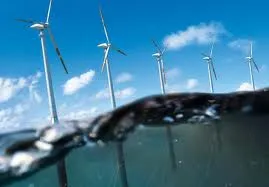
Fukushima's offshore wind project opposed by fishing community
Local fishermen aare opposing the government-sponsored project to build a huge, floating wind-power installation in waters off Fukushima Prefecture.
The central government of Japan has come up with the idea of floating about 100 windmills in the Pacific Ocean off Fukushima to generate much-needed electricity. But the scheme could force the local fishing industry to restrict its operations.
Thus the Fukushima prefectural federations of fisheries and fish processing cooperative associations are standing firmly against the project.
Akira Egawa, the 65-year-old deputy chief of the Iwaki Fisheries Cooperative Association, said, "If the fishing ground is destroyed, we will not be able to make a living. It is a life-or-death issue." While acknowledging that the project will cause trouble to people in the local fishing industry, the central government says it will consider possible compensation after the project is actually carried out. Meanwhile, Marubeni stated, "We would like to consider making rules to ensure they can fish safely."
Yoshihiro Niizuma, executive director of the Fukushima fishing body, said, "We fear that we may not be able to do trawl fishing anymore. That's the main line of our business. We can't cooperate with the plan easily also because the safety of the floating windmills is uncertain."
Fish caught in waters off Fukushima Prefecture have registered more than the government-imposed limit of 500 becquerels of radioactive cesium per kilogram, but there are some kinds of fish whose radiation levels have begun to decline. The offshore wind power project surfaced suddenly at a time when the fishing body was considering resuming catches on an experimental basis, based on the results of fish inspections by the prefectural government.
In what could be the world's biggest offshore wind-power project -- aimed at generating 1 million-kilowatts of power, equivalent to the generating capacity of one nuclear reactor -- about 100 windmills would likely be installed in the ocean. The government plans to build and float three windmills with a total output capacity of 16,000 kilowatts as an experiment from fiscal 2011 to 2015.
Sources say that it is most likely that the facility will be built in waters 100 to 150 meters deep and 20 to 40 kilometers away from the shore of Iwaki, Fukushima Prefecture.
For the source of this story, click here.








![Cross Domain [Manu + SBR + ABF + ABR + FMCG + HBR + ]](https://cmg-qa.s3.ap-southeast-1.amazonaws.com/s3fs-public/styles/exclusive_featured_article/public/2025-01/earth-3537401_1920_4.jpg.webp?itok=WaRpTJwE)
![Cross Domain [SBR + ABR]](https://cmg-qa.s3.ap-southeast-1.amazonaws.com/s3fs-public/styles/exclusive_featured_article/public/2025-01/pexels-jahoo-867092-2_1.jpg.webp?itok=o7MUL1oO)









 Advertise
Advertise


